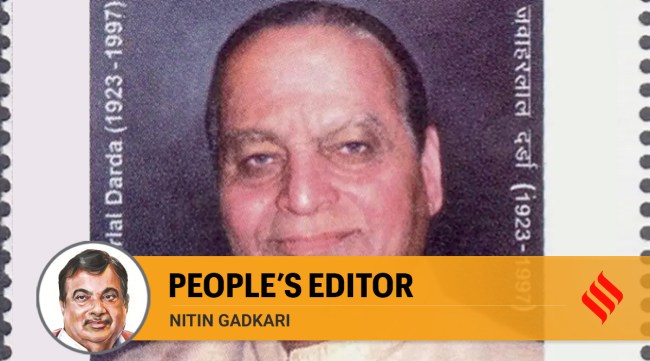Opinion Nitin Gadkari on Jawaharlal Darda: People’s editor
His journalism and political life was rooted in public welfare
 Veteran freedom fighter and founder editor of the Lokmat Media Group, Jawaharlal Darda alias Babuji (Image source: Wikipedia)
Veteran freedom fighter and founder editor of the Lokmat Media Group, Jawaharlal Darda alias Babuji (Image source: Wikipedia)
The birth centenary of veteran freedom fighter and founder editor of the Lokmat Media Group, Jawaharlal Darda alias Babuji has jogged fond memories of my personal affinity with him. The kaleidoscope of his social and political work is also revolving before my eyes. Babuji had a different chemistry with me. Our generation received his guidance in the initial stages of our student life and then after we entered politics. He always supported and guided us. He was a leading journalist and editor of Maharashtra and a leading politician of his time.
He was a minister for a long time. But he did not bring journalism into politics and did not allow politics to enter journalism. He belonged to the Congress. But from the beginning, Babuji laid the foundation for all kinds of opinions to get reflected in Lokmat. The Lokmat family maintains the same tradition even today. Babuji developed the ideal of fearless journalism. After becoming active in politics in the post-independence period, Babuji started the great mission of enlightenment through Lokmat.
Under his guidance, Lokmat developed a system to ask questions pertaining to the masses, bring about comprehensive discussions on important national and local issues and introduce various topics to readers according to the changing times. Lokmat is a great example of how a daily newspaper can become a part of public life and credit for it goes to Babuji, and after him to the skillful and mature family members like Vijaybabu and Rajendrababu.
He passed on many virtues such as interest in art and literature, friendly nature, beauty, eloquence and neatness from his own personality informally to the Lokmat family and many others who came in contact with him.
Babuji’s contribution to the freedom struggle is unparalleled. Yavatmal district had spontaneously responded to the call of the freedom struggle and gained the attention of personalities such as Mahatma Gandhi, Lokmanya Tilak, Sardar Vallabhbhai Patel, Subhas Chandra Bose and Pandit Jawaharlal Nehru. Yavatmal district was actively engaged in the freedom struggle and credit for rekindling the nationalist spirit among the people should be given to freedom fighters like Babuji. Babuji is among the most prominent freedom fighters in the Yavatmal district.
In 1941, Mahatma Gandhi announced a personal satyagraha against British policy. The call for satyagraha found immediate resonance in Yavatmal. Babuji mobilised a group of people and led the protest. He was also imprisoned for his active participation in the freedom movement. He was always ahead of his contemporaries in thought and action.
Babuji was brave, yet restrained. He always thought of the welfare of the society. After independence, he devoted himself to constructive work. He made great contributions in the fields of industry, health and education. He was a visionary who always thought of the welfare of society.
He would say that if the future of India is to be changed, the light of education should be introduced into the mainstream society, and even the people from rural and remote areas should be able to avail of its many benefits. Despite being in politics for a long time, Babuji did not let the valuable insights into public welfare, which he got during his participation in the freedom movement, wear off in the euphoria of Independence. He insisted that journalism should be used to solve problems in rural areas. That is why he launched Lokmat.
Babuji’s specialty was to treat leaders of Opposition parties with courtesy. As a person, he was big-hearted. He respected his opponents, irrespective of their party affiliations.
Babuji deeply felt that Vidarbha should progress. During his tenure as the state industries minister, he set up industrial estates in many areas. Babuji’s arguments in the state legislature were unparalleled. He used to come to the House after good preparation and pointedly speak on issues. He used to say that the legislature is for constructive discussion in the interest of the people.
I still remember Babuji’s smiling face, his ability to work and his eagerness to make people’s lives easy. Babuji believed that good people should come into politics. Therefore, he always encouraged good people regardless of the party they belonged to. He had a vision for development. He was essentially a people’s man who used his power and position for the public welfare.
I pay my humble tributes to this great son of Maharashtra on the occasion of his birth centenary.
The writer is Union Minister for Road Transport and Highways






